A day in the life: Ayeong
Get to know an Environmental Engineering Technology - Water Resources student
Name: Ayeong
Program: Environmental Engineering Technology - Water Resources
Campus: Ivany Campus
Class: 2026
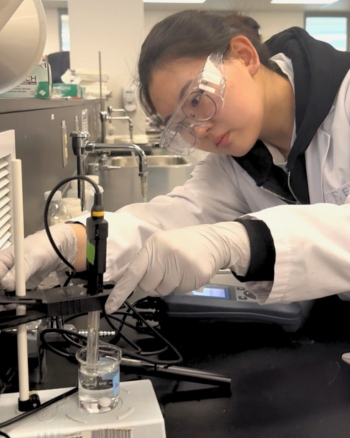
What were you doing before you started the Environmental Engineering Technology – Water Resources program?
I graduated from high school in Nova Scotia and then went to Korea to meet my family, then I returned and started the program.
Why did you decide to pursue the Environmental Engineering Technology – Water Resources program?
I've always cared about the environment but am especially interested in water-related issues. The Environmental Engineering Technology – Water Resources program at NSCC stood out to me because it focuses on real-world, hands-on learning. I liked the idea of doing both classroom learning and fieldwork.
Why did you choose to study at NSCC?
I chose NSCC for the fieldwork and hands-on experience, and I think I made a good choice.
What is water and environmental engineering?
It's about protecting the environment, especially water. You learn how to test water, manage pollution and work on real life solutions to help keep ecosystems and communities safe.
What do you learn in the Environmental Engineering Technology – Water Resources program?
We learn both science and practical skills to protect water and the environment. We study things like:
- water treatment
- environmental monitoring
- geology
- and biology.
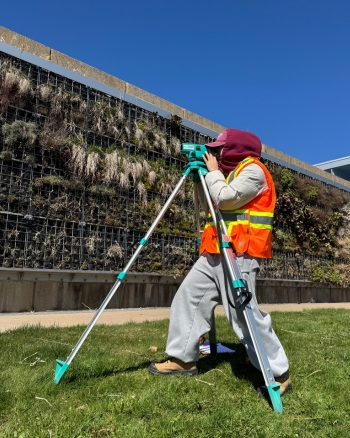
There's a lot of hands-on learning, too. We do things like:
- field trips
- collecting water samples
- using equipment to test things like pH (water’s acidity) and turbidity (how cloudy the water is)
- learn how to read maps
- and understand soil and rock types.
It's a great mix of theory and real-life experience.
What are some assignments you’ve worked on?
We do a mix of labs, reports, quizzes and field assignments. We recently did some field work outside of Ivany Campus where we surveyed ground levels and elevation relative to the sea level to determine groundwater flow, direction and the slope of the area. These are all helpful skills to know for working in industries like environmental consulting or construction, where you need to be able to identify possible soil contamination sites and know where to build.
What types of tools or equipment do you use?
We use a lot of different tools depending on the course. For example, we use pH meters, turbidity tubes, compasses, surveying equipment, etc. It's really cool to get hands-on experience with professional equipment.
What’s your favourite place on Ivany Campus?
I really like the study spaces near the big windows at Ivany Campus. There's a lot of natural light and it's a quiet place to focus. When the weather is nice, resting in the sun really relieves stress. It’s peaceful and refreshing.
What’s something that’s surprised you about your program?
I was surprised by how much hands-on learning we do. I expected more lectures, but we actually go out in the field a lot and use real equipment. It makes everything feel more practical and connected to what we'll be doing after graduation.
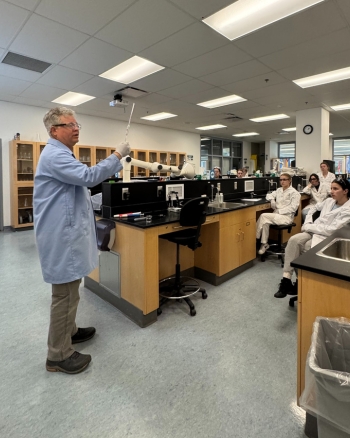
Do you have any advice for someone who might be interested in taking the Environmental Engineering Technology – Water Resources program at NSCC?
If you're passionate about the environment and you enjoy learning by doing, this program is a great fit. Don't worry if you don't know everything at first. Just stay curious and ask questions. The instructors are super helpful and you'll learn a lot along the way.
What does a typical day look like in your program?
-
Morning - In the morning, we usually have theory classes. We learn about things like geology, physics, chemistry and biology. It's mostly classroom based but really important for the hands-on work we do later.
-
Afternoon - Afternoons are often for labs or fieldwork. We might be outside collecting water samples or in the lab testing them. Sometimes we also work on group projects or use mapping tools. It's the most active part of the day.
-
Evening - In the evening, I usually spend time finishing assignments or reviewing class notes at the library or at a study spot on campus. If I have time, I just relax after a busy day.
About the environmental engineering technology industry
Amanda McPherson, Faculty for the Environmental Engineering Technology – Water Resources program, shares some insights on the industry and what students can expect to learn:
Are environmental engineers in demand in Canada?
In Nova Scotia, yes. Few students leave the province for work, although when they do, they don’t have problems finding employment.
Why is environmental engineering important?
Professionals are required for protecting and conserving our water resources, treating water to drinking water quality standards and treating wastewater to discharge standards.
When contamination of water, soil and/or air occurs, professionals are required to assess the damage and provide methods for management and/or clean up.
Professionals are required for land development and redevelopment (commercial, industrial) projects to ensure contamination does not occur.
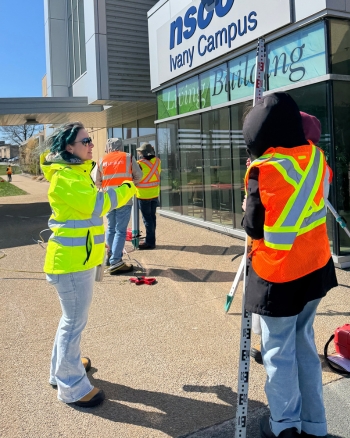
What is the role of environmental engineering in protecting natural resources?
Environmental engineering protects soil, water and air from contamination through assessment and application of environmental regulations. Professionals remediate (clean up) water and soil contamination and prevent water (lakes, rivers and groundwater) and soil from being depleted as a resource.
What are some industries that rely on environmental engineers?
- Environmental and engineering consulting
- Mining, energy sectors (oil and gas, electricity/power), landfilling
- Liquid and solid waste treatment and processing
- Laboratory analytics
- Construction
What are some career paths for environmental engineers?
- Municipal, provincial and federal government jobs. These could be jobs that involve implementing environmental projects or compliance with environmental regulations.
- Environmental and engineering consulting. People start out doing field work related to water, soil, air and hazardous building materials assessments.
- Water and wastewater treatment operators.
- Some pursue careers that are more civil-related, like materials testing and geotechnical work.
- Laboratory analytics.
- Nongovernmental organizations (NGOs).
What’s something future students should know about this program?
Math and chemistry skills are important for program success – students can upgrade their high school courses or pick up missing credits through NSCC’s Adult Learning Program – Academic Upgrading if they need to. There’s a lot of laboratory and field work in addition to classroom delivery. There’s a large variety of content covered in the program, and a wide range of skills are developed.
Related Stories
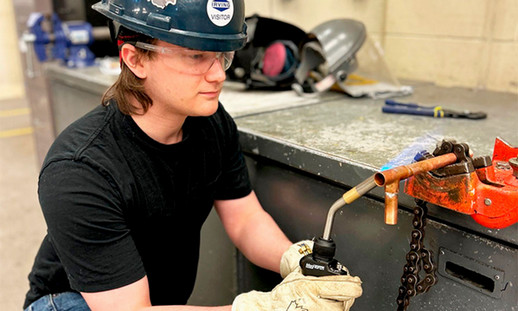 A day in the life: Austin
A day in the life: Austin
Follow along with Austin for an inside look into 3 distinct trades that make up NSCC's Pipe Trades program.
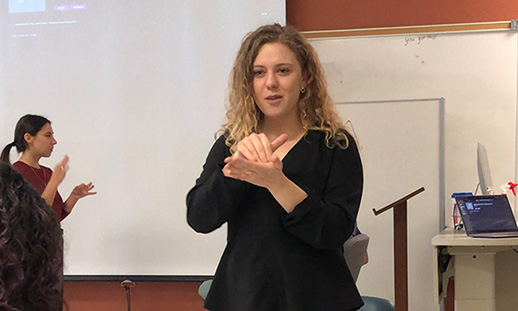 A day in the life: Cornella
A day in the life: Cornella
Cornella shares a day in the life as an American Sign Language / English Interpretation student at Ivany Campus.

